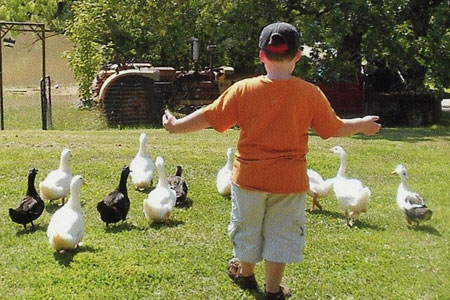
Maybe you already keep chickens or other poultry and are considering adding ducks. Or maybe you’re thinking of starting with ducks as your first foray into the world of poultry. To help you decide whether or not duck keeping is for you, here are some of the benefits of keeping ducks.
Ducks are easy to house.
Ducks require little in terms of housing, since they prefer to be outdoors. All they need is a simple shelter where they can get in from bad weather and where they can be enclosed at night as protection from predators. A fence will further deter predators, while keeping the ducks from wandering afar.
Ducks are super healthy.
Ducks remain healthy when furnished with adequate facilities for safety, comfort, and sanitation, provided clean water for drinking and bathing, and fed a balanced diet. Duck diseases are rare. Any health issues are more likely to involve an injury or other noncontagious condition.
Ducks are easy to control.
Ducks generally follow the leader. Since they move as a group, they are easy to herd. They are also creatures of habit. Once they learn the daily routine, such as going inside their shelter at night, they don’t need reminders.
Ducklings grow fast.
Ducklings require less time under brooder heat than most other backyard poultry. When daytime temperatures remain above 65°F and nights are not overly chilly, ducklings may live permanently in their outdoor shelter and fenced run at about 4 weeks of age.
Ducks thrive in all climates.
Ducks are both heat tolerant and cold hardy. They are less apt than chickens to suffer in warm weather and are less sensitive to cold weather. And they don’t mind wet weather. In fact, they love it.
Ducks are excellent at pest control.
They love foraging in the garden for slugs, snails, grasshoppers, potato beetles, and more. In a pond they are good at controlling mosquito larvae, as well as duckweed and other unwanted vegetation. Given sufficient forage, ducks can satisfy up to 90% of their own nutritional needs.
Ducks produce fertilizer.
For gardeners, one of the benefits of keeping ducks is their copious production of high-nitrogen fertilizer. Waste gleaned from a duck shelter makes excellent compost. Water from a duck pool may be drained into the garden as liquid fertilizer. The water dilutes the droppings enough to avoid causing nitrogen burn to growing plants.
Duck eggs are delicious.
A quick online search reveals a multitude of culinary and nutritional benefits of duck eggs, which can cost a pretty penny at the local farmers’ market. Luckily, one of the benefits of keeping ducks is the ready availability of fresh duck eggs.
Duck meat is excellent.
Duck meat is both flavorful and inexpensive to produce. Because ducks are fast growers and good foragers, they can be ready for the table at much less cost than most other poultry. Although ducks have a lot of internal fat, the meat itself is pretty lean.
Ducks are gentle.
They hardly ever fight with one another, and rarely if ever attack humans. Of course, family or visiting dogs, children, and all others should be taught to move quietly among the ducks and never chase or tease them. Treated with respect, ducks readily become attached to their human handlers.
Ducks are attractive.
They come in a variety of colors from all white, brown, or black to a patchwork of mixed colors including iridescent green and brilliant blue. Swimming in a pond or just wandering around the lawn, ducks add an elegant touch to any backyard.
Ducks are fun!
Watching their antics provides endless hours of entertainment. The seemingly peculiar behavior of ducks often makes us humans laugh out loud. Lots of folks keep ducks simply for the pure joy of it.
Helpful Links
Ducks for Eggs — How to Keep Your Ducks Laying Well
Furnishing Nests for Laying Ducks
Keeping Ducks Together with Chickens
Duck Breeds Offered by Cackle Hatchery®
And that’s today’s news from the Cackle Coop.
Gail Damerow is the author of An Absolute Beginner’s Guide to Raising Backyard Ducks : Breeds, Feeding, Housing and Care, Eggs and Meat.


I bought some Lavender Ameraucanas this year. Very sweet beautiful birds.